Portafilter Espresso Machine
The classic Italian espresso is prepared with a filter holder espresso machine.
Portafilter espresso machines exist in many different forms, our goal is to describe the espresso brewing process which is the same regardless of the machine in use.
Coffee for Portafilter Espresso
First choice for italian espresso are, of course, the italian espresso blends, perfectly roasted for this method of coffee preparation.
Nevertheless, single origins (Beans originating from a single estate, plantation or country) which have been roasted for this kind of coffee preparation are also very recommended, depending on your personal taste.
Grind Level for Portafilter Espresso
Finding the right grind for a perfect espresso shot is certainly one of the biggest challenges for the Barista.
Basically, the grind should be finer than for the moka pot, but not too fine either.
If the grind is too coarse the coffee is under extracted - the water flows too quickly through the coffee.
Is the grind too fine it "burns" the coffee and the espresso will be over extracted.
To make things even more complicated - other factors which affect the grind are: the freshness of the beans, the roast level and even the humidity.
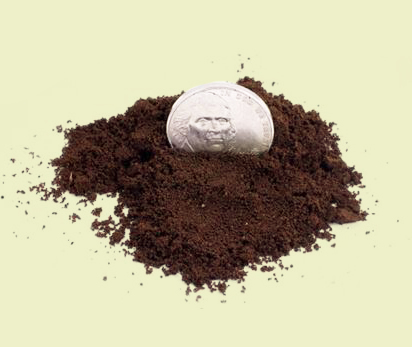
Brew Ratio for Espresso
The Italian espresso Institute (Instituto Nazionale Espresso Italiano) indicates the perfect amount of coffee for one espresso with 7 g (+/-0, 5 g).
It has become quite common to depart from this amount and use up to 10g per Espresso (and more).
A rule of thumb
Coffee flows too quickly -> grind may be too coarse
Coffee flows too slowly or not at all-> grind may be too fine
Don't forget: Tamping pressure, type of coffee, waterpressure are all additional factors contributing to the perfect espresso.
Therefore the goal of every barista is not perfecting one of the components but to bring everything in perfect balance.
Espresso brewing with the portafilter espressomachine
The perfect espresso consists of a variety of components - starting with the quality and freshness of the beans, the equipment (Grinder, Portafilter Espressomachine) and finally the experience and skills of the barista.
To begin with, here the definition of a perfect espresso (Instito Nazionale Espresso Italiano):
- Coffee quantity: 7g +/- 0,5g
- Coffee outlet temperature: 88°C +/- 2°C
- Water pressure (on the coffee puck): 9bar +/- 1bar
- Extraction time: 25 Sekunden +/- 5 Sekunden
- Amount of liquid in the cup: 25ml +/- 2ml (sometimes 30ml)
We recommend that these details be regarded as a basic guideline - as already mentioned, it is quite common to use a higher amount of coffee, or customize the brewing temperature - just according to personal taste and type of coffee.
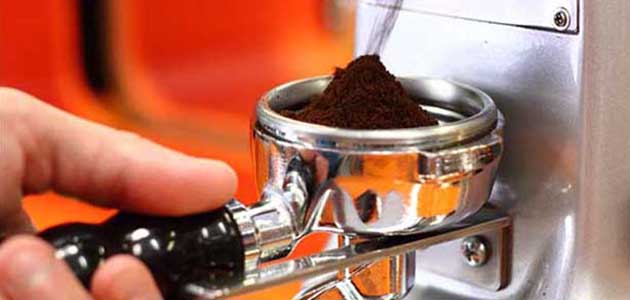
1. | Grind 7g of coffee into the portafilter
(See also „Grindness“)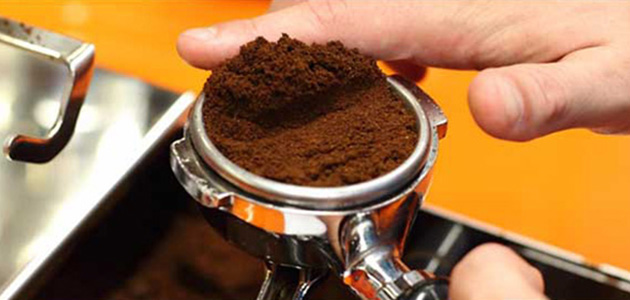
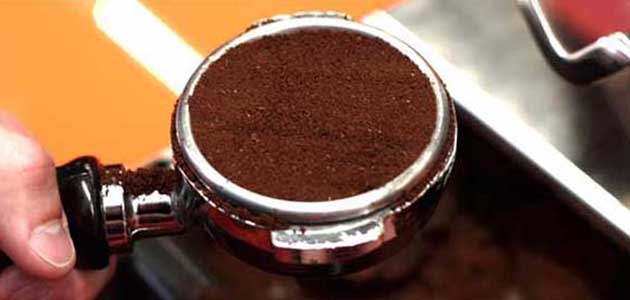
2. | Distribute the ground coffee
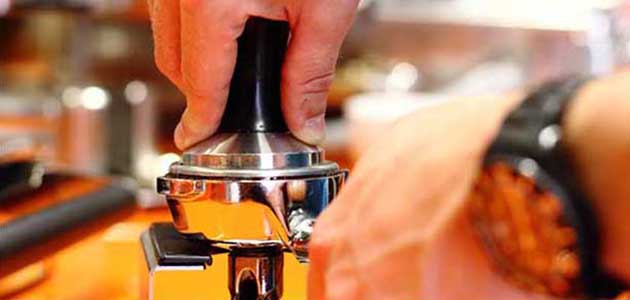
3. | Tamping
is an essential part of the preparation
a. The portafilter should be placed on a solid surface or
b. Firmly press (tamp) the ground coffee, as straight as possible, with about 15 kg pressure into the portafilter. Again: the pressure applied is not subject to any "fixed" rule:
Essentially, Tamping pressure and grind have to be balanced– finer grind – less pressure, coarser grind – more pressure
c. Smoothing: With the palm of your hand, clear the portafilter of any coffee residues at the top. This is important, so that the grouphead stays clean.
Tamping variations
The following variations / additions do exist and are an integral part of various "philosophical" debates between baristas whether their effects:
Pre-Tamping
After step a) but before step b) press with 2 kg or less to achieve a smooth coffee surface then continue with step b) or:
Knock
There may be coffee residue on the inner edge of the coffee filter (if the tamper has not 100% the inner diameter) – by gently "knocking" the portafilter with the handle of the tamper you can lose this residue before continuing with step b). Caution: do not knock too hard to avoid cracks in the coffee puck
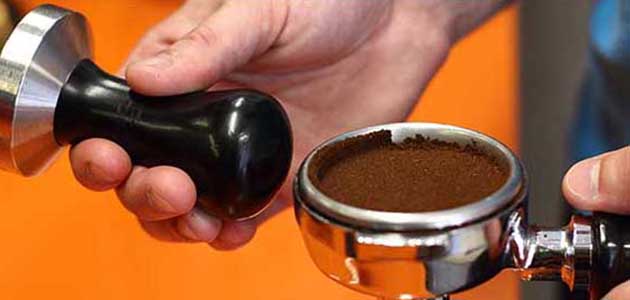
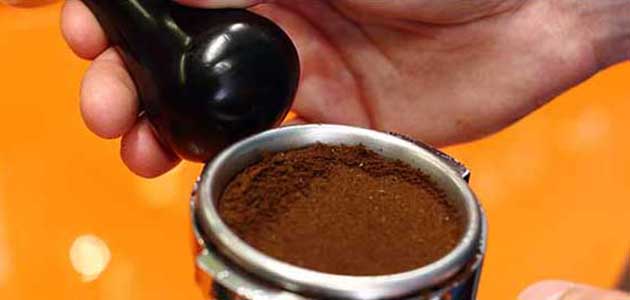
Polishing
after step b) put the tamper on the compressed coffee and let it slowly turn to smoothen the surface
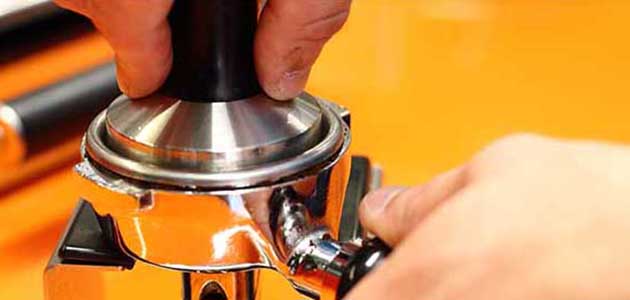
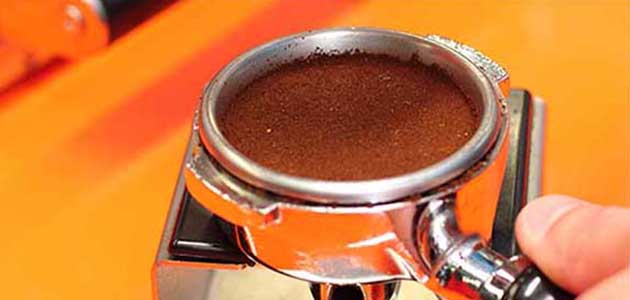
4. | Flush
Before you clamp the portafilter into the machine, shortly flush the grouphead to drain overheated water
5. | Clamp the portafilter into the espresso machine and start the brewing process
6. | Extraction for 25-30 Seconds
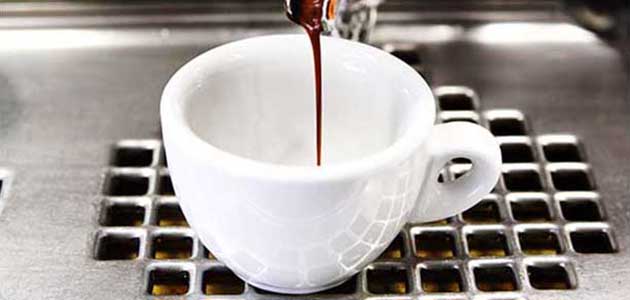
Ideally the coffee flows „like a mouse tail“ in your espresso cup. A good indicator when to stop extraction is when the flow begins to become lighter and watery (also known as "blonding")
7. | Done! Enjoy your perfect espresso!
Remarks
The espresso cups should be pre-heated. Usually the espresso cups rest on top of the espresso machine which pre-heats the cups. If that is not the case, heat the cups by pouring hot water into them. This is important, as cold espresso cups will immediatly draw the heat from your espresso.
To get a feel for time and amount of coffee you can use Shot-glasses with markings and a stop watch.
Indications for the right Espresso Extraction
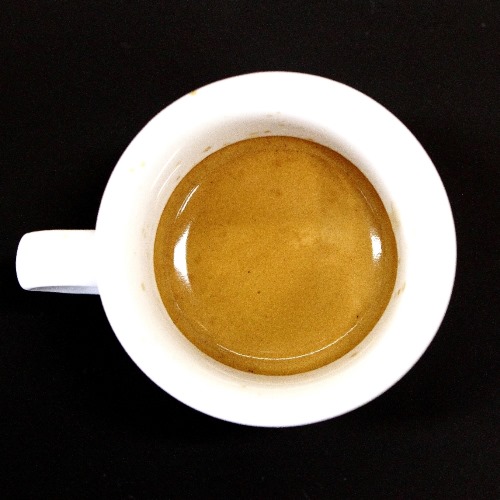
Under-extracted Espresso
Under-extraction means that not enough flavour has been extracted.
Taste under extracted coffee is lacking body, tasting sour and lacking sweetness.
Visual very bright and thin crema.
Reasons for under-extractions:
- Grind level too coarse
- Not enough coffee
- Not enough tamping pressure
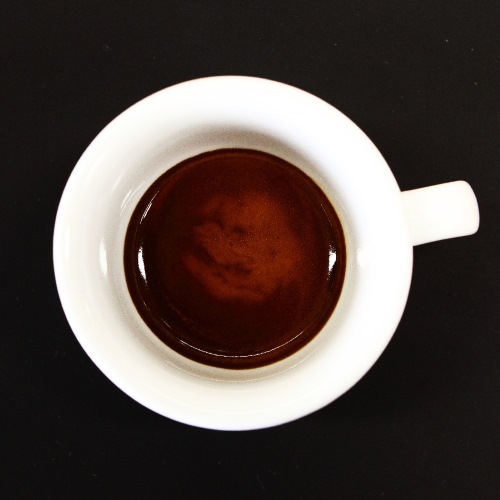
Over-extracted Espresso
Over-extracting means, that too much of the flavours have been extracted.
Taste over extracted espresso tastes bitter and burned.
Visual very dark crema with almost black at the edge.
Reasons for over extraction:
- Grind level too fine
- Too much coffee in the portafilter
- Too much tamping pressure
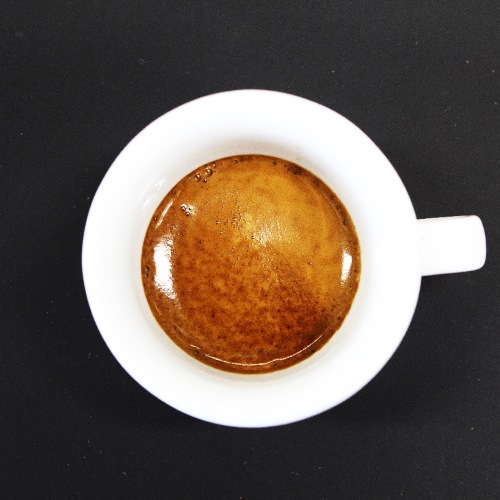
Ideally extracted Espresso
All flavours are perfectly extracted and in balance.
Taste depending on the blend (Arabica/Robusta und Herkunft der Bohnen) the perfect espresso tastes sweet,clear and has a fine acidity.
Visual an even, solid hazelnut brown crema and occasionally the famous "tiger stripes".
